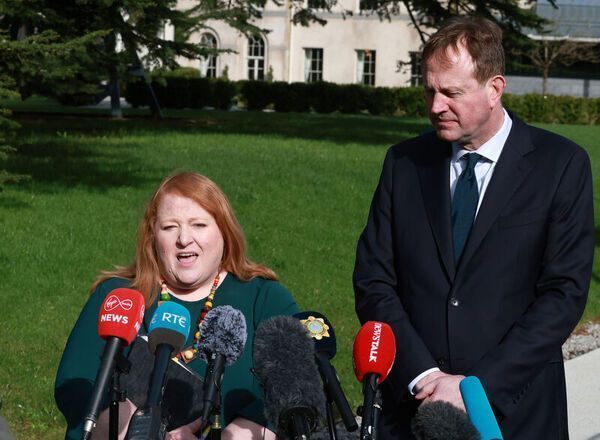Aedin Moloney,left, and Rachel Pickup in Charlotte Jones's "Airswimming," a 2013 Fallen Angel / Irish Repertory Theatre production. PHOTO: CAROL ROSEGG
“If we had tried to get into the arts by the traditional route,” Marie Mullen, the co-founder with Garry Hynes in 1975 of Galway’s Druid Theatre, said recently, “neither of us would be working in the theatre today.” Against the backdrop of the controversy surrounding the Abbey Theatre’s 2016 season – with its lack of women playwrights – Honor Molloy talks with three Irish-born women who have forged their own creative paths in the American theatre.
“We are our first beginnings,” Edna O’Brien said in a recent BBC radio interview. I spent my early years in Dublin and, although I left it at the age of 8, that town will never leave me. I’ve been making theatre in Manhattan since 1984. Much of it tells an Irish story, so I always have my eye – and an ear – out for fine Irish actors.
On Henry Street in Brooklyn, a bunch of Irish ex-expats gathered for a meal. “Come for a meal,” my friend Olive said. “And you must meet Bronagh, she’s a character.”
Elbow-to-elbow, seated around a groaning kitchen table, eight of us tucked into ham, peas, cabbage and spuds. There was apple tart for dessert, with heaps of Irish cream. A Sunday dinner the likes of which I hadn’t eaten for ages. Across from me: “Bronagh Murphy, I’m a nurse, midwife and actress.” Her smile wide and proud.
Bronagh spent her working years catching babies at the Rotunda and nursing AIDS patients in Manhattan during the worst of the epidemic. She often straddled life's threshold and held an understanding of humanity so funny and so rare that I thought, let’s write a play.
Set in the Rotunda, the oldest maternity hospital in Europe, “Maiden Voyages” was included in the Boston Women in Theatre Festival, received a reading at the Irish Arts Center, was workshopped with the Cusack sisters at London’s Royal Court and New Georges produced the world premiere at the Beckett Theatre in 1993.
Bronagh returned to Ireland, where she nursed at the Rotunda’s HARI Unit for IVF, while I kicked around the Lower East Side, doing performance art and writing plays.
In 2002, I scored a ticket to Mike Finn’s “Pig Town” at the Irish Repertory Theatre. An 8-year-old lad with a scratchy voice and scabby knees caught my eye. A tiny role, but that little rotter was the stand-out of the play.
The next time I saw him, it was in the role of Lucia Joyce in a reading at the Irish Arts Center. I looked in my program: Aedin Moloney. He was a she. Her credits included stage and film work in London, Ireland and New York. She was obviously a formidable talent, so I cast her as Nuala Fury, the cheeky boxer in my melodrama, “Madame Killer” (2005).
Aedin is the founder and producing artistic director of Fallen Angel Theatre Company, whose primary focus is to present plays written by and about Irish, British and American women. Moloney formed the company in 2003 for “a number of reasons,” she told me recently. “At the time there was a gap in the market for contemporary Irish and British plays representing the women I know. I thought, why not take it into my own hands?”
She has since presented with her company Fallen Angel the American or world premieres of Victoria Woods’s “Talent” (Producers’ Club, 2004), Paula Meehan’s “Cell” (Gene Frankel Theatre, 2009), Barbara Hammond’s “Eva the Chaste” (The Clurman Theatre, 2011), and “Airswimming” by Charlotte Jones (Irish Rep, 2013). “Producing gave me a back bone. It took the mystery and fear out of the business.”
Of the company’s audience, 40 to 60 percent has never before been to the theatre. “It’s a New York company. Our work is relatable to all cultures and themes,” Moloney said, “We all make up this beautiful city.”
I’m sure it’s her commitment to diversity and community-building that led the de Blasio Administration to recently appoint her to the Cultural Affairs Advisory Commission to the City of New York. Aedin is the first Irish woman to receive this honor, which is a testament to her singular vision, her resourcefulness and her determination.
Towards the end of 2011, I took a seat at the Irish Rep. The lights dimmed, and the audience was transported to the fictional town of Ballybeg. It’s late summer, 1936 – about the time of lughnasadh, the Celtic harvest festival. Gathered in a country cottage are five unmarriageable women – the Mundy Sisters.
[caption id="attachment_81494" align="alignnone" width="200"] Jo kinsella
The Irish Rep’s Artistic Director Charlotte Moore directed with skill and sensitivity, creating a tightly-knit ensemble. The feeling of family that she and the actors evoked was palpable. Aedin was unforgettable as Rose, but I also noticed this tough Mundy sister upstage right, lurking at the sink, dancing in a shapless frock and wellies, tossing flour into her face with mad abandon: Jo Kinsella. Her performance was earthy, soulful, lasting.
As a girl in Waterford, “I joined the local theatre group,” actor Jo Kinsella explained in an interview. “And we went on tour. In competition with old John B. Keane and Teresa Deevy.” Kinsella added: “Trinity Drama. That’s what I wanted. That’s what I always wanted. But I didn’t have the money. So I was a care assistant in hospital from the age of 19 to 23. And doing factory work as well.”
Kinsella moved to Woodside, Queens in New York City, in 1999 and “stayed with a girl from my parish.” A few years later she was in a bar, when she grabbed up a microphone, and sang “Happy Birthday” like Marilyn Monroe. Playwright and actor Jimmy Kerr was in the audience. “He asked me if I wrote my own material,” she remembered, “‘No, I just say whatever comes into my head.’ Twenty minutes of standup and this is how my career started.”
During the 2012 1st Irish Festival, which is presented by George Heslin and the Origin Theatre Company, Kinsella was cast in two plays that ran concurrently – dramatist and actor Laoisa Sexton’s “For Love” and “House Strictly Private” by Jimmy Kerr. “‘House’ was all monologues and rewrites. So I had all this to memorize and then rewrites for both plays.”
“For Love” was a smash hit, so Charlotte Moore brought it to the Irish Rep. That wasn’t the only bit of good news in Kinsella’s life. “I find out I’m pregnant,” she said.
After closing in New York, “For Love” went on a six-week tour to Derry, Dublin, Galway, and Waterford. Kinsella recalled: “It’s April and it’s cold Ireland. I’m freezing in the wings and five months pregnant. But I don’t care how pregnant I am, I wanna be onstage.” And Jo, laughing, said, “We left Waterford with euros in a plastic bag. Coins. That was our taking.”
When I asked Jo about her proudest moment she said, “‘Lughnasa’ taught me everything. I gave it everything. Wearing my wellies and my big dress, throwing flour on my face, I love that I could touch my face. I was so free after that. It taught me freedom. Just freedom.”
At 18, Geraldine Hughes moved to Los Angeles to study acting at UCLA. “I didn’t know anything about life, except how to survive a war. I was a naïve young Irish woman with no focus and no accomplishments other than escaping what I had just escaped – Belfast.”
During her early years in LA, Hughes went to college, nannied and joined a little pub theatre that had a couple of bartenders who wanted to be actors. In the late 1990s, Hughes was in a month-long run of “The Cripple of Inishmaan,” which landed her an Equity card. She has subsequently built a successful acting career that encompasses three Broadway shows and a wide range of roles in television and in film.
“Back in LA, I would be talking about Belfast with my friend, the producer Kim Terrell.” Geraldine recollected. “Kim wanted to know if I’d written my stories down. I told her I had a few. She said she’d like to come over and could I read them out to her. So I did.”
Terrell encouraged Geraldine to weave together these stories about her life in Belfast. When Hughes presented the first act in Los Angeles, the audience’s encouraging response was, “Where’s the second act?”
In 2003, “Belfast Blues” opened in a 30-seat converted shoe shop. The original five-week run, produced by Kim Terrell’s Virtual Theatre Project, was extended to 15 weeks. Hughes has since taken the play to London, Chicago, Galway, Belfast and the Derry Playhouse. “‘Belfast Blues’ is the most beautiful thing I’ve created to date,” Hughes told me. “It’s the reason I have everything I have today. I’m unapologetic about my story. As a writer, a female Irish artist, I’m so happy this is part of my legacy. You have to create your own – because this business is so torturous, so crazy. Everyone on the outside, they aren’t show folks. They only see when I’m on television. They didn’t see me through the 15 auditions.”
Around the time Anjelica Huston and the Culture Project produced the New York premiere of “Belfast Blues,” Geraldine moved to Manhattan. “I didn’t feel at home until 10 years ago. [Northern Ireland Bureau head] Lorraine Turner welcomed me into the fold, introduced me to the right people. I have friendships and relationships here that make me feel I belong. The Irish community – in the darkest moments, they will be there for you. It’s like a code of love between us. That’s community. And that’s family.”
Hughes feels similarly about Irish Rep. “That is a home,” she said. “They’ve given so many actors their start, made them Equity. And Charlotte is the matriarch.”
Hughes appears in the soon-to-be-released film, “Book of Henry,” but her main cinematic goal is to see a screenplay of her own made into a film, a romantic comedy set in Belfast. “Northern Ireland Screen funded the development of the script and now I’m out shopping it.” Geraldine certainly hasn’t deserted the theatre. “I’m battling to fix a new play that I’ll self-produce.” And it’s only a delight to learn that Hughes will bring “Belfast Blues” back to New York City next year.
Jo Kinsella is out auditioning, appearing in productions and new-play workshops. Since the birth of her daughter, she’s picked up a pen and is writing and performing humorous stories about her life. I hope she does what so many actors have done before her and turn this into a one-woman show.
In April 2016, Aedin and her company Fallen Angel will stage Sharman Macdonald’s “When I Was a Girl I Used to Scream and Shout” at the Clurman Theater. This will be the fourth play Aedin has produced at the Off Broadway contract level – no small achievement in a time of rising costs and shrinking budgets.
[caption id="attachment_81495" align="alignnone" width="300"]
Next year, I will present a literary evening called “Voices Carry - A Celebration of Irish Women Writing.” Featuring the works of Maeve Brennan, Teresa Deevy, Maura Laverty, Claire McAllister, Edna O’Brien and Lucy Greeley, this presentation will draw from a variety of work – memoir, fiction, poetry, drama – that spans the 20th Century. This will be an evening where actors read alone or together, where words ring off the walls, flowing back and forth between the funny, the bold, the free.
“And your dear friend Bronagh?” people ask. “Where is she?”
Where is she, but gone. Bronagh Murphy succumbed to leiomyosarcoma – a rare form of cancer – in 2009. But she’s very much alive in our play
“I had trained to be a midwife in a large Dublin hospital and the women I nursed inspired the characters,” she said to me. “I sat on their beds and talked with them. I knew their lives intimately.”
There is nothing like the intricate and intimate lacework threading through our lives.
All we have are our stories. Listen.
Timeline:
1993 – “Maiden Voyages” by Honor Molloy and Bronagh Murphy (New Georges, New York City)
2002 – “Pigtown” by Mike Finn (Irish Repertory Theatre, NYC)
2003 – “Belfast Blues” by Geraldine Hughes (The Virtual Theater Project, Los Angeles)
2005 – “Madame Killer” by Honor Molloy (Clubbed Thumb, NYC)
2005 – “Belfast Blues” by Geraldine Hughes (Culture Project, NYC)
2009 – “Cell” by Paula Meehan (Fallen Angel, NYC)
2011 – “Eva the Chaste” by Barbara Hammond (Fallen Angel, NYC)
2011/ 12 – “Dancing at Lughnasa” by Brian Friel (Irish Repertory Theatre, NYC)
2012 / 2013 – “For Love” by Laoisa Sexton (Origin’s 1st Irish Festival / Irish Repertory Theatre, NYC / Irish Tour)
2013 – “Airswimming” by Charlotte Jones (Fallen Angel / Irish Repertory Theatre, NYC)
2014 – “Four Women and a Boat” by Geraldine Hughes and Jimmy Kerr (Origin’s 1st Irish Festival, NYC)
2016 – “When I Was a Girl I Used to Scream and Shout” by Sharman Macdonald (Fallen Angel, NYC).









